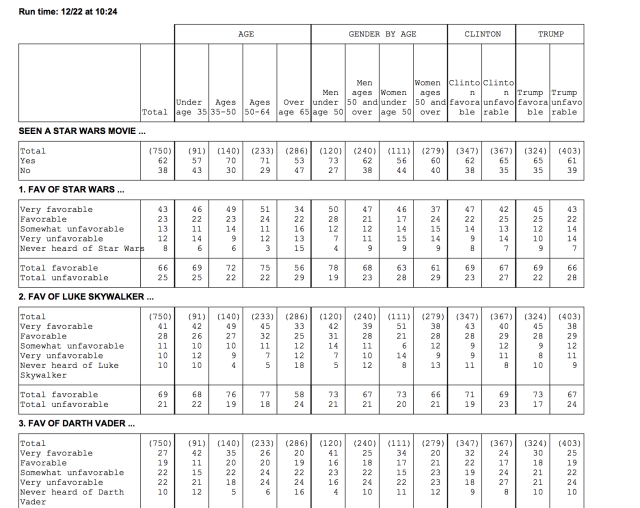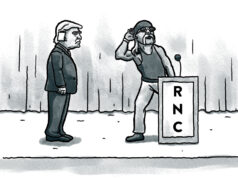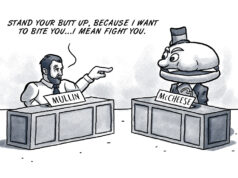
It can be hard to know what to make of political polls.
Real Clear Politics may well offer the best accumulation of poll numbers for the 2016 presidential election and beyond, but figuring out which numbers to “believe” is a task above the average voter’s pay grade.
For instance, a Gravis Marketing poll taken Dec. 18 through Dec. 21 includes this explanation of its results:
The poll has a margin of error of ± 3% [5% for Republican and Democratic caucuses]. The total may not round to 100% because of rounding.
I hate it when my numbers don’t round because of rounding!
But that wouldn’t stop Hillary Clinton supporters from gloating about Gravis giving her 49 percent to 31 percent advantage over Bernie Sanders. Nor would it stop Ted Cruz supporters from citing his 31 percent tie with Donald Trump as a sign of momentum.
Fast-forward to an NBC / Wall Street Journal / Marist poll from Jan. 2 through Jan. 7, and Sanders supporters are likely ecstatic. The poll shows the Vermont senator trailing only 3 percent behind the former secretary of state in Iowa. Cruz supporters are even happier, with this poll showing him leading Trump by 4 percent.
Interestingly, the Marist poll does not note its margin of error in its explanation post, but most people surely don’t care in our headline-driven society.
‘Most people just want to see the score’
So, what will happen Feb. 1 when Democrats and Republicans caucus in Iowa to kick off 2016 presidential voting? Beats the hell out of me. Hillary Clinton did not do well in Iowa in 2008, and the caucus system is different than a traditional primary election. Donald Trump’s polling numbers have been impressive, but how much experience does his team have running GOTV (Get Out The Vote) efforts?
What I do know, however, is that some American political junkies are addicted to posting polling numbers that favor the candidate of their choice. National politics in America have taken on an air of sports fandom, and if Trump, Cruz, Rubio, Sanders or Clinton fans see a number that gets them excited, they will post it to Facebook or Twitter in a heartbeat. Often, the conclusions drawn by those I see posting poll numbers are amusing. No one beyond trained political scientists and trained political hacks discusses margins of error, sample size, representational accuracy or the overall source of polls. Most people just want to see the score and have a visceral reaction.
Just this past week, I saw people on both the far left and the far right of the political spectrum post articles about polls that had favorable headlines for their candidate of choice. Bernie Sanders had overtaken Clinton in Iowa, and Marco Rubio’s support was growing steadily, the articles noted. I clicked both last week, only to notice that each story — and, thus, poll — was more than three months old.
Star Wars polling — Trump, Clinton, Skywalker and Vader
It’s with these words of caution about poll numbers that I present you the most enjoyable poll I’ve seen all campaign season. It came from the Democratic firm Fletcher Rowley, which is based in Nashville. John Rowley authored a commentary for NonDoc during our first week, which remains quite relevant today: If Trump wins, conventional wisdom loses, again.
Rowley sent me his newest poll during Christmas, and he had published an analysis of its findings on Huffington Post. (Interestingly, HuffPo has two John Rowleys who regularly contribute content, but the site lacks a search function with which to find material easily. Am I the only one who finds that odd?)
Rowley’s poll examined public perception of Star Wars and, in some cases, compared the favorability of the movie franchise’s characters with presidential contenders. The results were amusing:
INSIGHT #4 – TRUMP NEGATIVES HIGHER THAN DARTH VADER & HILLARY
Trump had the highest negatives (54%) of any film character or politician tested, while Hillary Clinton was a close 49%. Darth Vader was at 44% negative. All three had 46% positive ratings though Clinton had the highest “very favorable” of the three at 31%.
That’s right, respondents to this poll (n=750) disliked Donald Trump and Hillary Clinton more than they disliked Darth Vader. I asked Mr. Rowley for the poll’s crosstabs — the data tables behind the headline, which breaks down the results by demographics.
Looking at those numbers, one can see Luke Skywalker’s 69 percent overall favorability divided by region of the country. In the Midwest, Skywalker’s favorability is a full 75 percent. In the Northeast, it’s only 61 percent. Darth Vader’s favorability is similarly highest in the Midwest (53 percent) and lowest in the Northeast (39 percent). Those damn yankees are critical folks, perhaps.
This MidWest v. Northeast analysis is also interesting for Clinton and Trump’s favorability. Clinton has 51 percent favorability in the Midwest but only 42 percent in the Northeast. Trump’s popularity is flipped — 45 percent in the Midwest and 49 percent in the Northeast. West of the Rocky Mountains, Trump’s favorability drops to 36 percent in this tongue-in-cheek poll.
Of those who view Clinton favorably across the country, 54 percent view Darth Vader favorably. Among those who view Clinton unfavorably, only 41 percent like Vader. For those viewing Trump favorably, 48 percent like Vader. For those who dislike Trump, only 44 percent like Vader.
So what do Trump and Clinton supporters both like? Well, they feel pretty similarly about The Force. Among those viewing Trump favorably, 65 percent like The Force. Among those viewing Clinton favorably, it’s the same number: 65 percent. Those who have unfavorable opinions of the two leading candidates still like The Force at roughly 60 percent favorabilities each.
This means … uhh …
What does this mean?
Nothing, of course. These numbers are not only mostly irrelevant to the actual 2016 election, but they are entirely irrelevant to the fictional world of Star Wars. They are fun to look at and might make good conversation over the dinner table or Facebook chat with friends. But they don’t say much about anything.
And that’s my warning: Don’t put too much stock in all the poll-number stories you see leading up to Iowa and New Hampshire.
Because, you see, it’s nearly impossible to know what percentage of Star Wars fans have landline phones over cell phones.
And it’s even harder to predict who will turn out at the Iowa caucuses or the New Hampshire voting booths to support each campaign.
May The Force and its high favorability be with all of them.
RELATED
“Don’t Star Wars my Star Trek” by Nick Work






















